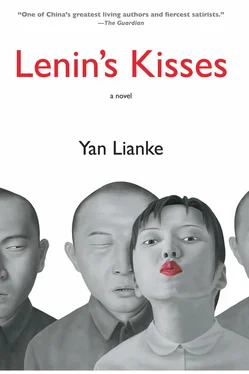Secretary Niu needed to read these internal documents immediately, before going to bed — just as children all over the world need to drink a glass of milk before going to sleep. He didn’t notice any of the other astonishing international news stories that appeared during this same six-and-a-half-year period, and instead focused only on a couple of short reports — each only about a hundred characters long — detailing Russia’s current economic difficulties. These reports described how there were insufficient resources for maintaining Lenin’s preserved corpse, how parts of the corpse had deteriorated owing to financing shortfalls, and how the officials looking after the corpse often had to run down to the government office to seek additional funds. The reports noted that some high-ranking Russian officials had recommended the corpse be entrusted to a company or political party — but given that the political parties willing to accept the corpse didn’t have the funds to pay for it, while the private corporations that had the funds had no interest in it, nothing ultimately came of this proposal.
Secretary Niu carefully examined the two reports, and then read back over the earlier Reference News article. He read the article again, then turned once more to the reports. He placed both the documents and the yellowed newspaper on a table and gazed intently at Deputy Chief Liu for what seemed to be an eternity. Finally, he said,
“Liu Yingque, pour me a glass of water.”
Deputy Chief Liu went to fetch him a glass of water, and asked,
“Secretary Niu, why do you think we should worry about the county’s economic state? There is actually treasure everywhere, and the question is really whether or not one is willing to go look for it.”
“Deputy Chief Liu, how old are you?”
“I was born in the year of the great famine.”
“This water is not hot enough. Go get me another glass.”
Deputy Chief Liu went to fetch another glass and Secretary Niu, left alone in the room, again glanced at the Reference News article and the two internal document reports. He picked them up and was about to read them again, but instead placed them down on the table.
About a month later, there was an upheaval in the county government, as a result of which the county chief was transferred to an office in the district seat of Jiudu and the district Party committee secretary was sent elsewhere to study. As a result, Deputy County Chief Liu was promoted to the position of county chief.
Under the expert direction of the county’s standing committee, County Chief Liu selected a date for purchasing Lenin’s corpse, and then went to an area outside the city to spend the night and reflect on his decision. The prospect of purchasing Lenin’s remains struck him as cold and tragic — though he wasn’t sure if this feeling was due to his sentiments about Lenin or to his misgivings about the idea itself. This was late autumn — the crescent moon hovered over the harvested wheat field ends, 11and the fragrant scent of crops and soil was everywhere. Chief Liu sat there deep into the night, pinching his leg and slapping his face to stay awake, then awkwardly knelt down and bowed three times in the direction of Lenin’s hometown in Russia, silently offering his apologies. The next day, he composed a document entitled “Shuanghuai County’s Directives Concerning Fund-raising and Attracting Investment in Order to Purchase Lenin’s Remains,” and distributed it to every council, office, township, and village throughout the county.
Several months passed in the blink of an eye, and the county’s tourism industry began to show signs of life. A road was opened running from the county seat to the Spirit Mountain forest, and although it was initially paved with cement, the visitor from Southeast Asia who had supplied the county with roads, electricity, and running water agreed to subsidize the entire cost of repaving it with black oil. 13On Spirit Mountain, various stones and other landmarks throughout the canyon were given distinctive names. One stone was called Horse-Whinny Stone, and another was Deer Looking-Back Stone. A cypress with a chinaberry tree growing out of a hole in its trunk was called the Husband and Wife Embracing Stone; and there was also a Guillotine Cliff, a Black Dragon Pool, and the Cave of the Green and White Serpent.
For each landmark, people were invited to come up with explanatory stories. For instance, the name “Horse-Whinny Stone” was inspired by the rebel Li Zicheng, who helped bring down the Ming dynasty. (It was said that after Li Zicheng’s defeat at Mount Funiu, he passed through here with a dozen or so followers, not realizing that more than ten thousand Qing imperial troops were waiting in ambush behind the next mountain, intent on finishing him off right then and there. When Li and his entourage arrived at this particular stone on Spirit Mountain, however, his horse suddenly came to a full stop and began whinnying incessantly. Eventually, Li had no choice but to turn around and head west, foiling the Qing ambush.)
The Deer Looking-Back Stone was said to have been inspired by a hunter who shot a deer and then pursued it for three days and three nights until he finally succeeded in trapping the animal at the edge of a cliff. As the deer was about to fall over the precipice, however, it suddenly turned to look back at the hunter, and at that moment it was transformed into a beautiful girl. The hunter married the girl, and proceeded to give up hunting and become a farmer, after which he and the girl lived happily ever after. The Husband and Wife Embracing Stone had a very moving story, and the Guillotine Cliff a tragic one. The Black Dragon Pool was once the home of an evil spirit, and the Green and White Serpent Cave was named after Xiao Qing and Bai Suzhen, the protagonists of the popular opera Legend of the White Snake .
In addition, a waterfall was being constructed that would be called Nine Dragon Cataract, and each county board and committee was expected to fund the construction of a new hotel or guest house on the mountain, which would be built in a classical Ming-Qing style. The heads of these local boards and committees began going to the bank to apply for credit, and some county boards — such as the wealthy postal-electric and transportation boards — even made direct investments of their own.
Construction had already started on a Lenin Memorial Hall, which from the outside would resemble the Chairman Mao Memorial Hall in Beijing, and inside there would be a crystal coffin containing Lenin’s preserved corpse. In the front of the hall there would be a room with Lenin’s corpse, a gallery of his images, and a collection of his writings, while in the back there would be a small theater showing films about his life and work. On both sides of the hall there would be temperature and humidity machines, to help preserve the remains. There would also be a break room for the workers, as well as a tea and a meeting room for distinguished guests. In front of the memorial hall there would be a garden, beyond which there would be a field flanked by parking lots, ticket booths, and gift shops. In the immediate vicinity of the memorial hall there would of course be plenty of restaurants and restrooms. The food in the restaurants wouldn’t be too expensive, and while there was some dispute within the county’s standing committee over whether or not the restrooms should be free or available for a fee, everyone agreed that they definitely needed to be clean. The stone path up the mountain would have a specified number of turns, and each of the hundred-year-old trees in the forest would be labeled with plates claiming that they were three hundred or even five hundred years old, while the five-hundred-year-old trees would be fenced off and labeled with plates claiming they were eleven hundred, nineteen hundred, or even two thousand years old. These sorts of arrangements were already well under way.
Читать дальше












